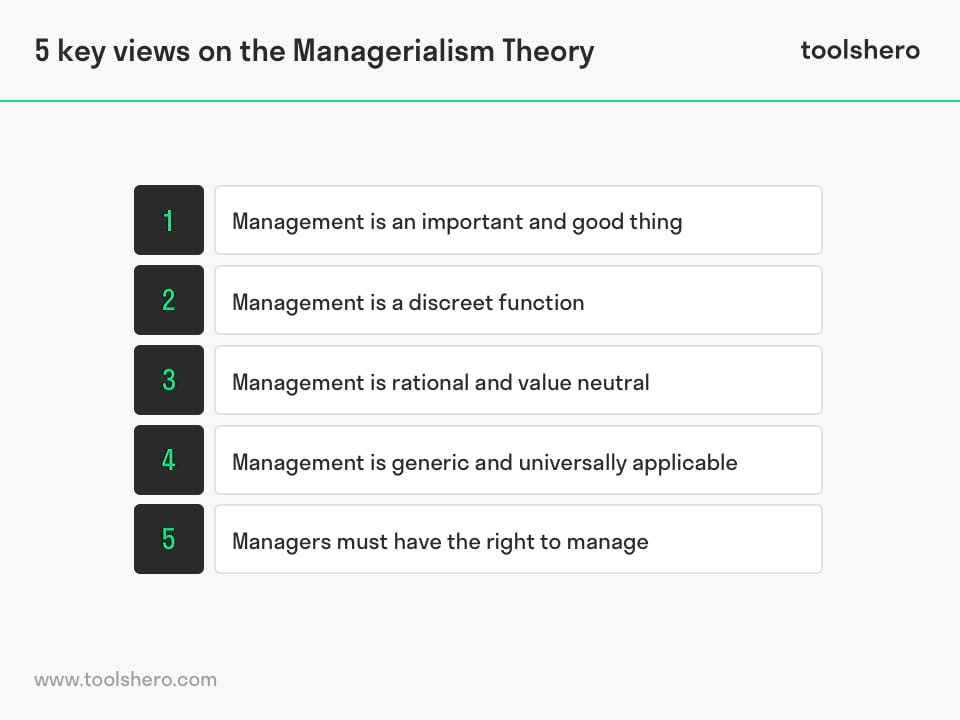Managerialism Theory

Managerialism Theory: this article provides a practical explanation of the Managerialism Theory. After reading, you will have a basic understanding of this powerful management tool.
What is the Managerialism Theory?
The Managerialism Theory refers to a collection of beliefs and practices about management, which together form an ideology.
In the early 1990s, the American management experts Locke and Spender described the managerialism ideology as an expression of a specific group—in this case management—that immortalises itself in an organisation and robs its owners of their decision-making powers. In short, the managerialism theory is about the sum of management, ideology, and expansion.
Little scientific research has been done on managerialism, and theoretical publications hardly exist. This is partly because it is a ideological vision that has a major influence on society. There is an increasingly common assumption that managerialism influences the economic, social, cultural, and political aspects of a society and that it has permeated every level of human interaction.
Some associate managerialism with neo-liberalism, bureaucracy, and hierarchy.
However, managerialism also seems to imply inappropriate or ineffective use of management and organisations, something which is not inherent to bureaucracy or hierarchy. The managerialism theory is also often linked to Karl Marx’ capitalism, described in Das Kapital.
In this work, Marx also speaks of what would later become known as managerialism. Das Kapital states that when owners of capital are no longer in control, and managers are only in positions of leadership on the basis of trust, we should speak of managerialism instead of capitalism.
Managerialism Theory: Neo-liberalism and Managerialism
Neo-liberalism is an expression of economic liberalism and considers the world as one major trading market.
Its aim is to create as many trade relationships between countries as possible, based on the principles of the free market. The neo-liberals, supporters of neo-liberalism, consider an open market the most effective and efficient way to distribute money, as well as goods and services.
Many consider the free market as a tool for economic prosperity, and at the same time as a way to increase supply for the benefit of consumers. In this context, neo-liberalism is a form of economic democracy that meets the demands of the people more directly than politics.
The managerialism theory can be understood as the pursuit of a series of ideals and ideas about management.
In 1997, researcher Gerring concluded that an ideology can be interpreted as action-oriented, with the intention to influence opinions and justify certain actions. This fundamentally different meaning and basis for two phenomena makes them essentially different from each other.
The managerialism theory promotes the interests of management and individual managers, and thus increases their social status and strengthens the organisational position.
5 Key Views on the Managerialism Theory
Based on previous management theories, researcher Sue Shepherd developed an ideal type of manager in the managerialism theory. Max Weber was the first to come up with an ideal type of manager in relation to capitalism and bureaucracy. Sue Shepherd defined her type with four propositions:
Management is an important and good thing
The fundamental principle of managerialism is that management is the optimal form of managing an organisation and the most important factor of organisational success. The reasoning behind this is that when processes are better managed, improved performance will inevitably follow.
Effective management and leadership must lead to the removal of red tape and inefficient processes. On a larger scale, more and better management should result in a progressive social force that has the capacity to resolve economic and social ailments.
Management is a Discreet Function
At the end of the last century, many organisations saw the introduction of supervisors. They were responsible for the efficient functioning of all organisational processes and for maximising profit to keep shareholders satisfied.
From this group of supervisors emerged a new group of highly trained professional managers. The managerialism theory assumes that increased supervision of employees has a positive effect on productivity. This would work optimally if all labour were checked and efforts were rewarded and punished.
This elitist view of management is related to the views on this in Theory X and Y. The discretion and exclusive right to make strategic decisions gives management its distinctive role compared to other positions. Managers are considered superior because of their skills and competences.
Management is Rational and Value Neutral
Because the managerialism theory has its origins in science, regardless of the small amount of research that has been done into it, much confidence is placed on management when it comes to planning and setting goals to improve performance.
Managers define the problem, collect and verify all the information they need, develop different solutions, and subsequently evaluate what they’ve done.
Management is Generic and Universally Applicable
Researcher Frederick Taylor believed that everything can and should be managed, and that management in one sector can be easily transferred to another sector.
He considered management as a series of generic activities that are almost equal in all organisations. In fact, it does not matter in what sector they operate. For supporters of the managerialism theory, there is little difference in running a university or an oil rig.
Managers Must Have the Right To Manage
One important requirement for managerialism is the right to discretionary power that authorises managers to take over all management functions in the area of planning, decision-making, monitoring, and coordination.
This also requires managers to take on a role based on authority. Regardless of whether they have the right skills or experience, they must present themselves as a superior manager with general knowledge that is so extensive that it is superior to specialisation.
Managerialism Theory summary
Managerialism is said to have a direct effect on everything that happens in society. Despite this view, little is known about the real influence of managerialism.
In fact, the question remains whether it is a scientific approach to management at all. Managerialism is an underdeveloped and elusive concept, and its boundaries and definitions have blurred over the years.
The ideal type of manager outlined in the theory has interfaces with the position of managers as described by Karl Marx in his vision of capitalism, among others.
The authoritarian, all-able manager must be given the freedom to decide everything, and will never harm his status as a professional who knows everything by asking people below him for advice.
Now it’s your turn
What do you think? Are you familiar with the explanation of the managerialism theory? Do you think managerialism has a positive effect on society and economic prosperity? Or do you believe it stimulates bureaucracy? Do you have any tips or additional comments?
Share your experience and knowledge in the comments box below.
More information
- Shepherd, S. (2018). Managerialism: an ideal type, Studies in Higher Education, 43:9, 1668-1678.
- Clarke, J., Gewirtz, S., & McLaughlin, E. (Eds.). (2000). New managerialism, new welfare?. SAGE Publications Ltd.
- Exworthy, M. (Ed.). (1998). Professionals and New Managerialism. McGraw-Hill Education.
How to cite this article:
Janse, B. (2019). Managerialism Theory. Retrieved [insert date] from Toolshero: https://www.toolshero.com/management/managerialism-theory/
Published on: 05/07/2019 | Last update: 09/29/2022
Add a link to this page on your website:
<a href=”https://www.toolshero.com/management/managerialism-theory/”>Toolshero: Managerialism Theory</a>







